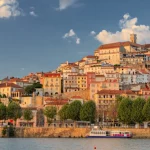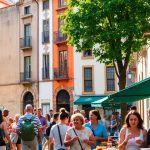Dive into Portugal: A Celebration of Festivals and Traditions
Portugal, a land of sun-kissed beaches 🏖️, delicious food 🍲, and stunning architecture 🏛️, is also a country rich in vibrant festivals and deeply rooted traditions. Whether you’re planning a trip or dreaming of moving to Portugal, understanding these cultural gems will enrich your experience and help you connect with the heart of the nation. This guide explores some of Portugal’s most fascinating festivals and traditions, offering a glimpse into the soul of this captivating country.
Why Understanding Portuguese Culture Matters
Imagine strolling through a bustling Portuguese market, the air filled with music and laughter. Or witnessing a solemn religious procession winding through ancient streets. These moments are more than just picturesque scenes; they’re windows into the Portuguese culture. By learning about the festivals and traditions, you gain a deeper appreciation for the history, values, and spirit of the people.
“Culture makes people understand each other better. And if they understand each other better in their soul, it is easier to overcome the economic and political barriers. But first they have to understand that their neighbour is, in the end, just like them, with the same problems, the same questions.” – Paulo Coelho
Major Festivals Across Portugal 🗓️
Portugal’s festival calendar is packed year-round. From religious celebrations to lively street parties, there’s always something happening. Let’s explore some of the biggest and most interesting:
Religious Festivals
- Fátima Pilgrimages: Taking place on the 13th of May and October, these pilgrimages commemorate the apparitions of the Virgin Mary to three shepherd children in 1917. Thousands of pilgrims flock to Fátima, some walking for days, to pay their respects and seek blessings. It’s a profoundly spiritual experience.
- Semana Santa (Holy Week): Celebrated throughout the country leading up to Easter, Semana Santa features solemn processions, religious ceremonies, and elaborate displays. Cities like Braga and Óbidos are particularly known for their Holy Week celebrations.
- Festas dos Santos Populares (Festivals of the Popular Saints): In June, Portugal celebrates its three popular saints: Saint Anthony (Santo António), Saint John (São João), and Saint Peter (São Pedro). These festivals are filled with street parties, grilled sardines, music, dancing, and colorful decorations. Each city has its own unique way of celebrating.
- Santo António in Lisbon: Known for its weddings, where couples get married in a mass ceremony sponsored by the city.
- São João in Porto: Celebrated with hammer fights (harmless, of course!), releasing paper lanterns, and jumping over bonfires.
- São Pedro in Póvoa de Varzim: Focuses on maritime traditions with boat processions and fishing-related activities.
Secular Festivals
- Carnaval: Before Lent, Portugal erupts in a riot of color and revelry during Carnaval. Similar to Mardi Gras, this festival features parades, costumes, music, and dancing. Torres Vedras and Ovar are famous for their Carnaval celebrations.
- Viana do Castelo Romaria: This grand festival in August is one of Portugal’s largest and most spectacular. It includes religious processions, folk dances, concerts, fireworks, and a grand parade showcasing the region’s rich cultural heritage.
- Faro Motorcycle Meeting: A massive gathering of motorcycle enthusiasts from all over Europe. The event features concerts, stunt shows, exhibitions, and a general celebration of motorcycle culture.
Regional Traditions: A Tapestry of Culture 🧵
Portugal’s diverse regions each boast unique traditions that reflect their history and geography.
Northern Portugal
Known for its strong Catholic traditions and Celtic influences.
- Caretos de Podence: In the village of Podence, during Carnaval, young men dressed as “Caretos” (devils) run through the streets, making noise and playfully harassing women. This ancient tradition is believed to ward off evil spirits and celebrate fertility.
- Festas Gualterianas (Guimarães): A celebration of the city’s history and cultural identity, featuring historical reenactments, parades, and traditional music.
Central Portugal
Characterized by its agricultural heritage and historical significance.
- Queima das Fitas (Coimbra): A week-long celebration for university students in Coimbra, marking the end of the academic year. It involves parades, concerts, and the burning of ribbons representing each faculty.
- Festas do Mar (Nazaré): A tribute to the sea and the fishing traditions of Nazaré, featuring boat processions, religious ceremonies, and seafood feasts.
Southern Portugal (Algarve)
Influenced by its Moorish past and coastal lifestyle.
- Noite Branca (Albufeira): A night-long party where everyone dresses in white and enjoys music, street entertainment, and special events.
- Feira de São Martinho (Portimão): A traditional fair held in November, featuring local crafts, food, and entertainment.
Islands: Madeira and Azores
Each island has its own unique cultural identity.
- Flower Festival (Madeira): A vibrant celebration of spring, with parades of flower-covered floats, floral carpets, and exhibitions. If you’re considering moving to Portugal, the vibes of Madeira are definitely something to experience! https://fincou.com/is-portugal-a-good-place-to-live/vibes-of-madeira-portugal/
- Sanjoaninas Festival (Azores): The largest festival in the Azores, celebrating Saint John with parades, concerts, bullfights, and traditional Azorean food.
Food Traditions: A Culinary Journey 🍽️
Portuguese cuisine is an integral part of its culture. Many festivals and traditions revolve around specific foods and drinks.
- Sardines: Grilled sardines are a staple of the Festas dos Santos Populares, especially in Lisbon.
- Bolo Rei (King Cake): Eaten during Christmas, this sweet bread is decorated with candied fruits and nuts.
- Caldo Verde: A traditional soup made with potatoes, collard greens, and chouriço (sausage), often served at festivals and celebrations.
- Pastel de Nata: These custard tarts are a national treasure, enjoyed throughout the year but especially during festive occasions.
Music and Dance: The Soul of Portugal 🎶
Music and dance play a vital role in Portuguese festivals and traditions.
- Fado: This melancholic genre of music is considered Portugal’s national song. It often tells stories of love, loss, and longing.
- Folk Dances: Each region has its own traditional folk dances, often performed during festivals and celebrations. These dances reflect the region’s history, culture, and way of life.
- Cante Alentejano: A traditional polyphonic singing style from the Alentejo region, recognized by UNESCO as an Intangible Cultural Heritage of Humanity.
Craft Traditions: Preserving Heritage 🏺
Portugal is known for its beautiful crafts, many of which are showcased and celebrated during festivals.
- Azulejos: These decorative ceramic tiles are a distinctive feature of Portuguese architecture. They are often used to decorate buildings, churches, and even streets.
- Filigree: A delicate form of jewelry making using fine threads of gold or silver.
- Pottery: Each region has its own style of pottery, ranging from colorful hand-painted ceramics to rustic earthenware.
- Basketry: Woven baskets and other items made from natural materials are a traditional craft in many parts of Portugal.
Tips for Experiencing Festivals and Traditions 💡
- Plan Ahead: Research the dates and locations of festivals you want to attend. Book accommodations and transportation in advance, especially during peak season.
- Learn Some Basic Portuguese: Knowing a few basic phrases will enhance your experience and show respect for the local culture.
- Be Respectful: Remember that these are cultural events, so dress appropriately and be mindful of local customs.
- Embrace the Experience: Immerse yourself in the atmosphere, try new foods, and interact with the locals.
- Check local sources: Tourism offices and local websites are the best source of the most up-to-date information
Interactive Element: Which Portuguese Festival is Right for You?
Find Your Perfect Portuguese Festival!
Conclusion: Embrace the Portuguese Spirit 🇵🇹
Festivals and traditions are the lifeblood of Portuguese culture. By immersing yourself in these celebrations, you’ll gain a deeper understanding of the country’s history, values, and spirit. Whether you’re a traveler or an expat, embracing these cultural experiences will enrich your life and create lasting memories.
Consider exploring resources like Fincou ( https://fincou.com/ ) for more information on living and traveling in Portugal.
Frequently Asked Questions (FAQs)
Q: What is the best time of year to experience festivals in Portugal?
A: It depends on what you’re interested in! Summer (June-August) is peak festival season, with the Festas dos Santos Populares and Viana do Castelo Romaria. However, there are festivals throughout the year, so check the calendar for specific events.
Q: Are Portuguese festivals family-friendly?
A: Yes, most festivals are family-friendly, with activities and entertainment for all ages. However, some events may be crowded or involve loud music, so consider your family’s preferences.
Q: How can I find out about local festivals and events?
A: Check local tourism websites, community centers, and newspapers for information on upcoming festivals and events in your area.
Q: Is it necessary to speak Portuguese to enjoy festivals?
A: While it’s not essential, knowing some basic Portuguese phrases will enhance your experience and allow you to interact more easily with locals.
Portugal is a country where tradition and modernity blend seamlessly. By exploring its festivals and traditions, you’ll unlock a deeper appreciation for this captivating nation and its people. Enjoy the journey!



